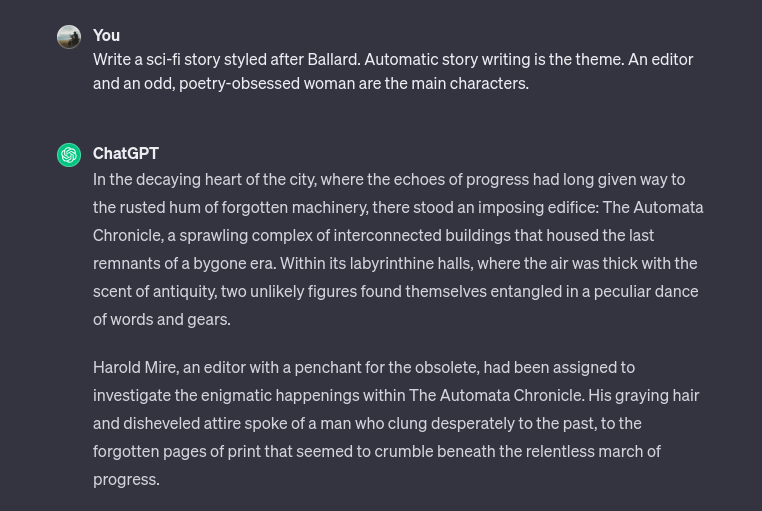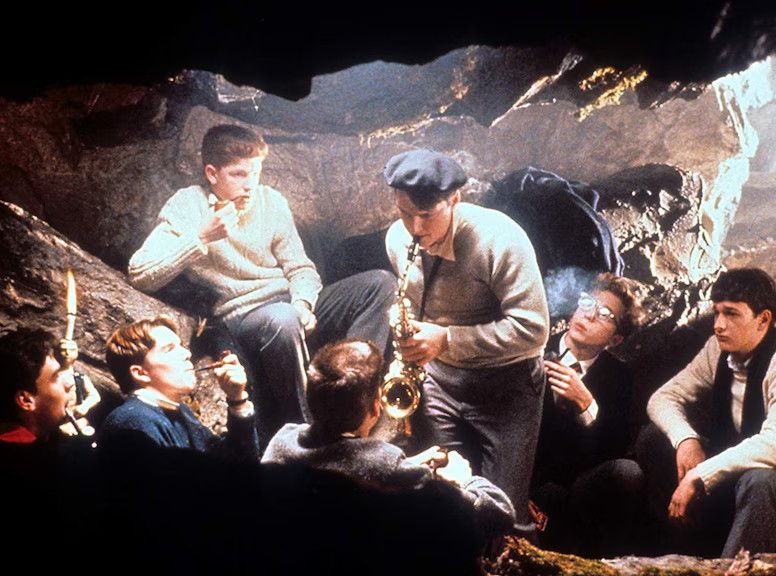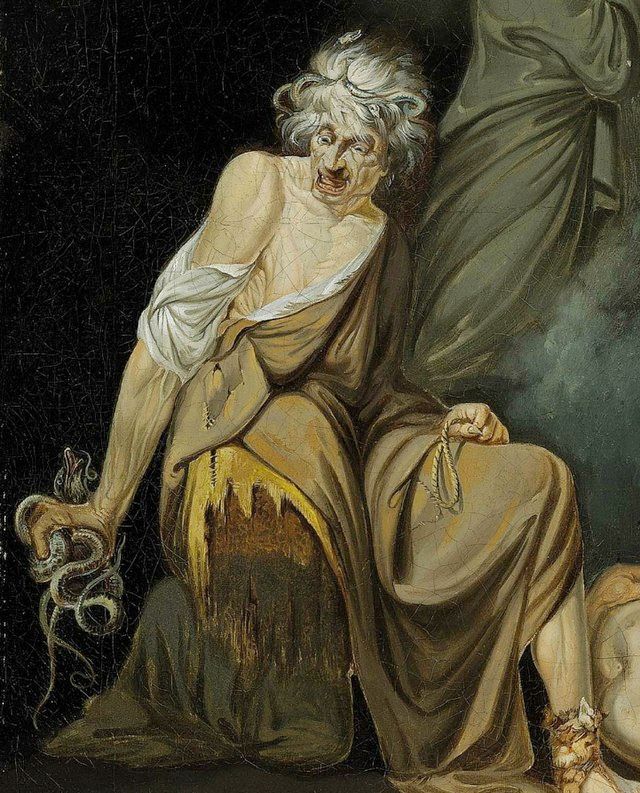Studio 5, The Stars: Ballard’s 1961 short story that anticipated the issue of generative AI
As early as 1961 (in the short story Studio 5, The Stars), Ballard anticipated one of the most topical and controversial issues of the day: The generation of texts with machines (or AIs).

Let me first explain how this came to pass. Well, from time to time I get together with a few friends at an old hunting lodge in a small grove not too far from my home. Imagine something like the Dead Poets Society of the movies. But we are less esoteric and have fewer hormones in our systems. We get together, have a few beers, and talk about books and stories. We look into each other's eyes and breathe the same air. In some ways, it is one of the most human dimensions we experience: We pick up shards of awe by looking at other people's faces. Amazing.

But beyond this. At our last meeting, I shared with the others a Ballard (1930-2009) story that I had never read. The great thing is that it happened to me; I did not choose it. The way it works is that each of us brings something to read and then gives it to a group member of his choice. I was given Ballard's Studio 5 The Stars short story, first published in Science Fantasy magazine in 1961.
The Verse-Transcriber
Ballard was Ballard! We know that he loved to describe, that he loved difficult and courtly words, that he was a fan of music, art, and mysticism. Ballard was a very erudite writer, so much so that sometimes it's hard to keep up with what he wrote, with the references he made. He always gave me the idea of someone in the middle of a pyramid of fiction and non-fiction books, studying astral maps and catching up on the physical and mathematical theories of his time (not very different from those of today). Or I imagine him wandering around some museum, some gipsoteca, some art gallery. In short, when I started reading, I expected to find his quirks, the secrets you already know he won't tell you, and all the information he puts into the stories that you can only really understand on the third or even fourth reading. Instead, I was confronted with the VT (Verse-Transcriber), a machine that can produce texts based on initial parameters provided by the writer. Similar to prompts you use with an AI.
Wave IX
When I read about this VT thing, I stopped. The others looked at me.
“So, Michael, are ya gonna read?”
“Get what Ballard means, guys?”
“Nope, but if you keep reading, we might.”
Well, I read on.
The story is set in Vermilion Sands (a fictional dystopic Ballard's place), where Paul Ransom, the main character, runs a publishing company that, among other things, produces a magazine that publishes poetry (Wave IX). All the texts are generated by the VT, which is built by an IBM agency in a place named Red Beach. The heart of the story centers on Ransom’s encounter with his mysterious new neighbor, Aurora Day. Every night and every morning, long strips of paper invade Ransom's yard, blow by the wind: they are Aurora Day’s poetry. Fascinated and repulsed by this elusive woman, Ransom takes an interest in her. He even steps in to save her from falling off a cliff during a mystical night walk of hers.

Evil Witch or Muse of Poetry?
Ballard's story orients our perceptions toward his habitual lunar light, his enigmatic reflections, his glow plays, his olfactory and auditory dystopias, in short, his typical science fiction writing. But what caught my attention was precisely the VT, this machine capable of producing written text, which in Studio 5, The Stars has so invaded human creative space that writers and poets no longer even remember how to write directly, that is, without the mediation of a machine. Aurora Day's role in this affair is to play the mythological Muse of Poetry Melander, to whom the fate of the young poet Corydon is linked, and who, in order to fulfill her desires, goes so far as to kill himself to create unforgettable poetic verse. Aurora Day/Melander’s intention seems to be to force the writers and poets working for Ransom to return to the true essence of the art of writing and literature by destroying the VTs in their possession and starting to write by hand again. The only one who succeeds is the young Tristram Caldwell, who has never used VT to write, preferring to continue in the more “human” way. He is the Corydon of the story.
I agreed with him, but of course Tony was somewhat prejudiced there, being one of those people who believed that literature was in essence both unreadable and unwritable. The automatic novel he had been „writing“ was over ten million words long, intended to be one of those gigantic grotesques that tower over the highways of literary history, terrifying the unwary traveller.
[From Studio 5, The Stars]
VT: the end of the art of writing
Paul Ransom is convinced that his strange neighbor is a deranged, bored rich woman. She is so caught up in her own personal fantasies that she can no longer distinguish them from reality. This is partly true. Aurora Day seems to be some kind of witch, followed everywhere by a hideous faun butler (with goat-like features). Life and death do not matter to her, nor does love; all that matters is art, the passion for poetry, for literary purity. She plays a role that she is trapped in, convinced that she is some kind of inspiring muse and is destined to fulfill her destiny, even to the point of killing and persecuting those who do not want to follow her. A creepy character, but one who forces others to ask themselves if the use of machines to replace writers and poets is the end of the art of writing:
She looked up at me idly, tracing patterns across the surface of the pool with a green-tipped finger.
“It all depends on you and your companions. When will you come to your senses and become poets again?”
I watched the patterns in the pool. In some miraculous way they remained etched across the surface.
In the hours, like millennia, we had sat together I seemed to have told her everything about myself, yet learned almost nothing about Aurora. One thing alone was clear—her obsession with the art of poetry. In some curious way she regarded herself as personally responsible for the present ebb at which it found itself, but her only remedy seemed completely retrogressive.
“You must come and meet my friends at the colony,” I suggested.
“I will,” she said. “I hope I can help them. They all have so much to learn.”
I smiled at this. “I‘m afraid you won‘t find them very sympathetic to that view. Most of them regard themselves as virtuosos. For them the quest for the perfect sonnet ended years ago. The computer produces nothing else.”
Aurora scoffed. “They’re not poets but mere mechanics. Look at these collections of so-called verse. Three poems and sixty pages of operating instructions. Nothing but volts and amps. When I say they have everything to learn, I mean about their own hearts, not about technique; about the soul of music, not its form.”
She paused to stretch herself, her beautiful body uncoiling like a python. She leaned forward and began to speak earnestly. “Poetry is dead today, not because of these machines, but because poets no longer search for their true inspiration.”
“Which is?”
Aurora shook her head sadly. “You call yourself a poet and yet you ask me that?”
[From Studio 5, The Stars]

Is that what’s happening to us, too?
In the end, we came to the conclusion that Ballard's genius anticipated a question that concerns us all today: When we use an AI to generate text and images (or whatever), who is the real author? Is it true writing? Are they really novels? Is it really poetry? Is it literature at all?
In Ballard's story, the writers have forgotten what it means to write on their own. They no longer know what it means to develop ideas, they just plug them into a machine and let it do the writing. Is that what’s happening to us, too? I believe that AI can be a valuable help and even partly replace humans in their creative role. But I also believe that an AI could not have written this Ballard's story, with the same inventive and perfection. I do believe that there is a distance between “skill” and “mastery” that no AI can ever bridge.
At least, I hope I'm right.
More Ballard's Short Stories
- “Manhole 69” (1957)
- “Chronopolis” (1960)
- “The Voices of Time” (1960)
- “The Overloaded Man” (1961)
- “Billennium” (1961)
- “Thirteen to Centaurus” (1962)
- “The Subliminal Man” (1963)
- “End-Game” (1963)
- “Time of Passage” (1964)
- “The Lost Leonardo” (1964)
- “The Terminal Beach” (1964)
- “The Drowned Giant” (1964)
- “The Beach Murders” (1966)
- XIV. “The Assassination of John Fitzgerald Kennedy Considered as a Downhill Motor Race” (1966)
- “Why I Want to Fuck Ronald Reagan” (1968)
- “Notes Towards a Mental Breakdown” (1976)
- “The Index” (1977)
- “The Dead Time” (1977)
- “News from the Sun” (1981)
- “Myths of the Near Future” (1982)
- “Memories of the Space Age” (1982)
- “Answers to a Questionnaire” (1985)
- “A Guide to Virtual Death” (1992)
More Insights
- Miracles of Life: Shanghai to Shepperton: An Autobiography (2008) - James Ballard's autobiography, detailing his childhood in Shanghai, experiences during World War II, and his writing career.
- Running Wild (1988) - A collection of interviews, essays, and reviews that provide insights into Ballard's views on literature, society, and culture.
- A User's Guide to the Millennium: Essays and Reviews (1996) - A collection of Ballard's essays and book reviews on various topics, including literature, art, and contemporary issues.
- Extreme Metaphors: Selected Interviews with J.G. Ballard (2012) - A comprehensive collection of interviews spanning Ballard's career, offering insights into his ideas and creative process.
Verse Transcriber-related news articles [here]:
- 200,000 Computer-Generated Books
- Computer 'Aesop' Writes Fables With A Moral
- Scheherazade, An Open Story Generator
- The Next (Computer) Rembrandt
- Xiaoice AI Now A Poet
- Shelley.ai AI Terrifies Thanks To Reddit's Nosleep
- Deepfakes From OpenAI GPT-2 Algorithm
